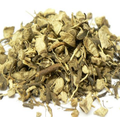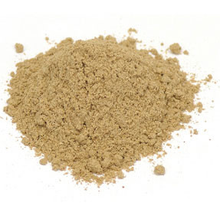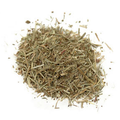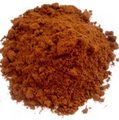 Loading... Please wait...
Loading... Please wait...- Home
- Bulk Herbs
- Herbs (S)
- Sheep Sorrel Powder
- Home
- Herbs - Organically Grown & Wild Crafted USA
- R S T
- Sheep Sorrel Powder
Product Description
Sheep Sorrel Powder
Also Known As - Rumex acetosella, Common Sorrel, Garden Sorrel, Dock, and Red Sorrel.
Wild Crafted - USA
Overview - Sheep sorrel is a perennial plant that grows in almost any soil. It has arrow-shaped leaves that have a lemony, sour taste. They are often used in salads and cooked with other greens to add a little zing to the dish. Sheep's sorrel is not as large as its cousins, French sorrel and Garden sorrel. Towards the end of summer the leaves may take on a reddish hue. Sheep's sorrel is one of the four ingredients in the controversial cancer remedy known as Essiac. It has also been used in Native American medicine for cancer. Sheep's sorrel is a laxative and diuretic. Sheep's sorrel spreads rapidly like mint, so you may want to put it in a pot to contain it.
Medicinal Uses – Internally, Sheep sorrel is used to treat cancer and detoxify the body. It is also helpful for chronic bowel troubles. This herb can help jaundice, liver, kidney and bladder problems like stones and gravel. It has also been used for hemorrhage in the stomach and to relieve excessive menstruation. Sheep sorrel is a very strong antioxidant plant. It also helps strengthen the immune system. The leaves are high in vitamin C, so this plant is useful for scurvy. It has also proved useful for cellular regeneration. It is anti-inflammatory, antibacterial and high in antioxidants. Externally, Sheep's sorrel can be used for eczema, itch and ringworm.
Other Uses – Sheep sorrel roots can be used to dye dark green, brown and dark gray. These dyes do not require a mordant to be colorfast. The leaves, roots and seeds can be eaten. The leaves can be made into a beverage resembling lemonade by boiling the leaves. The leaves will also thicken soup. The leaves give off a juice that can curdle milk to make cheese.
Herbs to Combine/Supplement - The famous Essiac formula is sheep sorrel, Turkey rhubarb, burdock root and slippery elm bark.
Parts Used - The leaves are used medicinally.
Cautions - Do not take sheep's sorrel if you have kidney stones. Excessive use may cause some laxatives to increase their action, so do not take this herb at the same time you take commercial laxatives. Large doses may cause side effects of stomach upset, nausea and diarrhea.
Preparation and Dosage - Sheep sorrel may be used as a paste, an herbal tea, a powder, a decoction, a juice or a soup.
- To make an herbal tea, use 1 teaspoon of dried leaves per 1 cup of boiling water. Drink 1 to 3 cups per day.
Disclaimer - The information presented herein by Mountain Maus’ Remedies is intended for educational purposes only. These statements have not been evaluated by the FDA and are not intended to diagnose, cure, treat or prevent disease. Individual results may vary, and before using any supplements, it is always advisable to consult with your own health care provider.
















